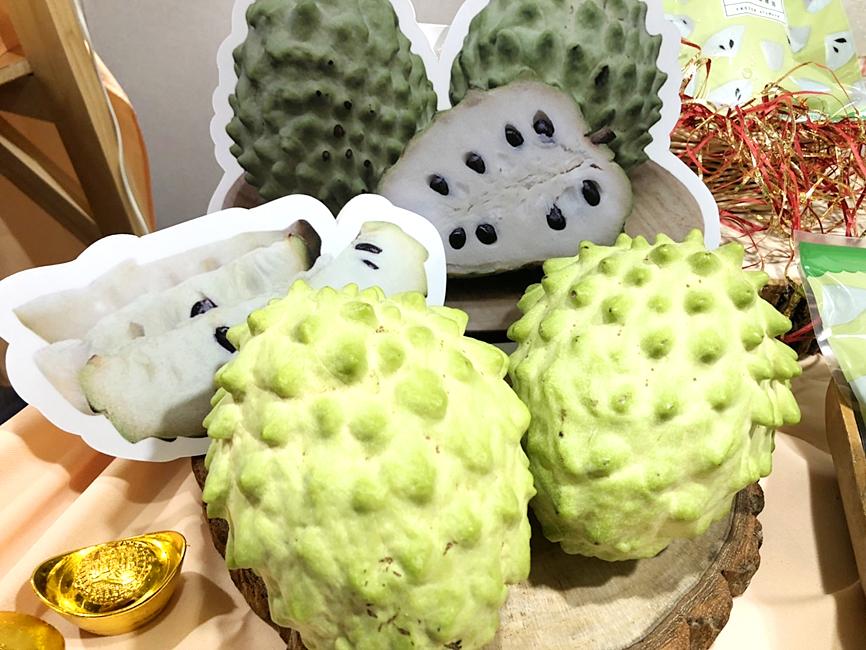The Council of Agriculture on Tuesday defended asking public enterprises to purchase pineapple custard apples, after employees complained they were “being forced” to buy the fruit to mitigate the effects of a Chinese ban.
Agriculture and Food Agency Director-General Hu Jong-i (胡忠一) made the comment at an event presenting products made from the fruit for the Lunar New Year, after China in September last year banned the fruit claiming imports contained invasive insects.
Also called atemoya, the fruit are a hybrid between cherimoya and sugar apples, notable for their pale green and bumpy skin.

Photo: Yang Yuan-ting, Taipei Times
The nation exports about 13,000 tonnes of pineapple custard apples each year, primarily to China.
To ease the effects of the Chinese ban, the council last year proposed a three-pronged approach involving domestic sales, foreign promotion and the development of processed atemoya goods.
On Jan. 6, it sent a letter to public and private enterprises encouraging them to help farmers and express their patriotic spirit by buying the fruit.
The council does not have the ability or the authority to force businesses to purchase anything, Hu said on Tuesday, adding that the letter was only meant to encourage businesses to support farmers.
More than 5,000 tonnes of the fruit have been ordered by domestic buyers, while more than 3,000 tonnes have been ordered by manufacturers, he said.
As pineapple custard apples typically fetch high prices when sold fresh and take three to five years to mature, little consideration had previously been given to processing the fruit, the council said.
Researchers and businesses spent two months working to create some of the first products made with pineapple custard apples, including soda and cake, which the council presented at a news conference on Tuesday.
Atemoya are rich in polyphenols, which give it a bitter taste when processed, said Hsieh Chang-wei (謝昌衛), a professor in the Department of Food Science and Biotechnology at National Chung Hsing University.
The flavor can be improved by adding matcha to create a shaved ice dessert or using it to make fermented drinks, he said.
In the case of products such as soda, it also extends the lifespan of the fruit, for at least a year, he added.
This week marks the start of harvest season, with wholesale prices at NT$67.2 per kilogram in Taipei.
Hu said he did not believe that holiday gift boxes of pineapple custard apples would affect sales of more popular seasonal fruits, as torrential rains in August last year reduced production of tangerines and jujubes by about 20 percent.

Civil society groups yesterday protested outside the Legislative Yuan, decrying Chinese Nationalist Party (KMT) efforts to pass three major bills that they said would seriously harm Taiwan’s democracy, and called to oust KMT caucus whip Fu Kun-chi (傅?萁). It was the second night of the three-day “Bluebird wintertime action” protests in Taipei, with organizers announcing that 8,000 people attended. Organized by Taiwan Citizen Front, the Economic Democracy Union (EDU) and a coalition of civil groups, about 6,000 people began a demonstration in front of KMT party headquarters in Taipei on Wednesday, organizers said. For the third day, the organizers asked people to assemble

POOR IMPLEMENTATION: Teachers welcomed the suspension, saying that the scheme disrupted school schedules, quality of learning and the milk market A policy to offer free milk to all school-age children nationwide is to be suspended next year due to multiple problems arising from implementation of the policy, the Executive Yuan announced yesterday. The policy was designed to increase the calcium intake of school-age children in Taiwan by drinking milk, as more than 80 percent drink less than 240ml per day. The recommended amount is 480ml. It was also implemented to help Taiwanese dairy farmers counter competition from fresh milk produced in New Zealand, which is to be imported to Taiwan tariff-free next year when the Agreement Between New Zealand and

A woman who allegedly spiked the food and drinks of an Australian man with rat poison, leaving him in intensive care, has been charged with attempted murder, the Taipei District Prosecutors’ Office said yesterday. The woman, identified by her surname Yang (楊), is accused of repeatedly poisoning Alex Shorey over the course of several months last year to prevent the Australian man from leaving Taiwan, prosecutors said in a statement. Shorey was evacuated back to Australia on May 3 last year after being admitted to intensive care in Taiwan. According to prosecutors, Yang put bromadiolone, a rodenticide that prevents blood from

China is likely to focus on its economy over the next four years and not set a timetable for attempting to annex Taiwan, a researcher at Beijing’s Tsinghua University wrote in an article published in Foreign Affairs magazine on Friday. In the article titled “Why China isn’t scared of Trump: US-Chinese tensions may rise, but his isolationism will help Beijing,” Chinese international studies researcher Yan Xuetong (閻學通) wrote that the US and China are unlikely to go to war over Taiwan in the next four years under US president-elect Donald Trump. While economic and military tensions between the US and China would